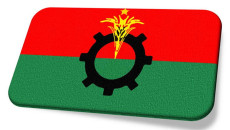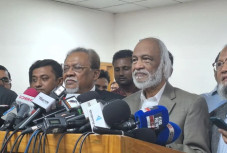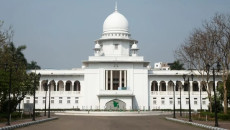
Saleem Samad
24 August, 2023 02:30
Sheikh Hasina bids farewell to her colleagues in Dhaka before emplaning for Johannesburg

Bangladesh Prime Minister Sheikh Hasina is prepared to participate at the BRICS Summit in Johannesburg, South Africa from August 22 to 24.
The BRICS 2023 summit is the fifteenth upcoming annual BRICS summit, an international relations conference attended by the heads of state or heads of government of the five member states: Brazil, Russia, India, China, and South Africa.
South African President Cyril Ramaphosa also invited the leaders of 67 countries to the summit, including 53 other African Countries, Bangladesh, Bolivia, Indonesia and Iran.
Bangladesh likely to get BRICS membership, says Foreign Minister Dr. Momen after meeting of Prime Minister Sheikh Hasina with South African President Matamela Cyril Ramaphosa in Geneva. Report say the issue was raised during the meeting between two leaders. #BRICS conference is… pic.twitter.com/azrgbHV0UX
Sheikh Hasina is likely to hold parleys on the sideline of the summit with her counterpart Indian Prime Minister Narendra Modi, Chinese President Xi Jinping and other leaders.
Russian President Vladimir Putin will skip the summit in person due to an arrest warrant issued by the International Criminal Court (ICC) for alleged war crimes in Ukraine. He will take part in the summit virtually and will be represented in Johannesburg by Foreign Minister Sergei Lavrov, reports Reuters.
The Chinese leader Xi will be taking the second overseas visit of 2023. It comes as China attempts to expand its geopolitical influence in the region, and also in South Pacific. The treacherous move has raised eyebrows among the many countries in South Asia, South East Asia, Far East Asia and Australasia.
The “BRIC” was coined in 2001 by Goldman Sachs economist Jim O’Neil to recognize the potential of emerging economies. Later the bloc expanded to include South Africa, adding to BRICS.
BRICS is an influential coalition of emerging economies that focuses on economic cooperation, peace, social and human development for developing countries.
As the BRICS is spreading wings, Bangladesh aims to create a new multi-polar world order and usher in a more diverse economy to override the influence of the United States and its dollar currency in the region.
Can BRICS currency shake the Dollar’s dominance? Joseph W. Sullivan, a senior advisor at the Lindsey Group and a former special advisor and staff economist at the White House Council of Economic Advisers during the Trump administration is not a sceptic and he believes de-dollarization is in the air.
Brazil’s president, Luiz Inàcio Lula da Silva, chimed. “Every night,” he said, he asks himself “why all countries have to base their trade on the dollar.”
BRICS is steadfast in its mission to establish itself as a formidable alternative platform to Western-dominated institutions like the IMF and the World Bank.
As expected, the United States and the United Kingdom have expressed concerns about the emerging BRICS alliance, while the European Union is inclined to support it, writes Maryam Ibrahim in the Diplomatic Insight.
At a time when Bangladesh is poised to join BRICS, there would be a prospective impact on the bilateral relations between Bangladesh and India to continue its development voyage.
Hasina is looking forward to political and moral support from her counterpart Modi to become a member of the most desired BRICS bloc. Dhaka is confident that Delhi would extend its hand to bring Bangladesh on board, according to insiders of the Ministry of Foreign Affairs in Dhaka.
Obviously, Dhaka is expecting New Delhi would help Bangladesh to reap benefit from the BRICS when the country’s forex has dwindled after the Ukraine-Russia war and have forced to curtail all government extravaganza expenditure and postponing non-essential projects, including funding official to travel abroad.
With Bangladesh joining the ranks, it could lead to increased economic ties and collaboration between the two neighboring countries. This could result in improved trade relations, investment opportunities, and infrastructure development, thus benefiting Bangladesh and India.
Besides the blocs alternative platform, BRICS would be further fortified, signaling a resounding call for reforms in global governance and facilitating cooperation within a framework.
India, as an existing BRICS [founding] member and would need to navigate the changing dynamics within the group and adjust its approach towards Bangladesh accordingly.
Combined, the BRICS bloc had a GDP (gross domestic product) of over $26.03 trillion in 2022, which is slightly more than the US. The five members of the bloc collectively represent about 27% of the world’s geographic areas and 42% of the world’s population. About 26% of steel and iron, 40% of corn and 46% of wheat are produced by BRICS countries. It has a $4.5 trillion combined forex reserve, reported the Arab News.
Dr Debapriya Bhattacharya, a distinguished fellow at the Centre for Policy Dialogue (CPD), sharing his insights on the economic potential and political ambitions of BRICS said Bangladesh is already a part of some alliances, like SAARC, BIMSTEC, and D-8. They also aim to enhance trade relations among member countries.
Well, the country has not seen significant benefits from these alliances. Bangladesh imports a significant amount of raw materials from the two key members of BRICS – China and India, he told the largest circulated daily newspaper, Prothom Alo.
Bangladesh’s interest in joining BRICS may stem from the broader effort to gear up the role of developing nations through a southern alliance, he said.
We have noticed different types of reprimands and punitive measures from some major world powers over elections as well as human rights conditions in Bangladesh. We have also seen diverse responses from the government, Dr Bhattacharya explained.
Researcher Sadia Aktar of Peace and Conflict Studies at the University of Dhaka explains that Bangladesh needs a relationship with the Gulf Cooperation Council (GCC) countries for its growing energy needs and BRICS can be the gateway for that.
As Saudi Arabia and UAE have already shown interest to engage in more flattering bilateral relations with Bangladesh, the admission of these three countries into BRICS will be a very important investment for Bangladesh in advancing its Muslim allies in the current world, she wrote in The GeoPolitics.
However, Dr Salem Nasser, professor of international law at Brazil’s FGV Direito SP University, does not believe that through joining BRICS the newcomers include Saudi Arabia, Iran, Argentina, the UAE, Bangladesh, Algeria, Egypt, Bahrain, Indonesia, Syria, from East Africa, West Africa and others will be aligning themselves with China or closing the door on collaboration with the West and says “BRICS represents a new pole of economic and political power which” can “compete with North American hegemony.”
- Saleem Samad is an award-winning independent journalist based in Bangladesh. Views expressed are personal. Twitter: @saleemsamad







 জকিগঞ্জে জুয়া খেলায় ৬ যুবকের কারাদন্ড
জকিগঞ্জে জুয়া খেলায় ৬ যুবকের কারাদন্ড 




 IT Lab Solutions Ltd.
IT Lab Solutions Ltd.
আপনার মন্তব্য